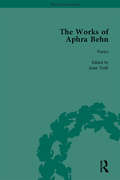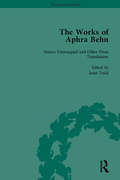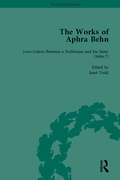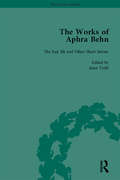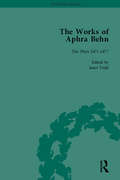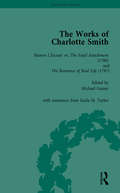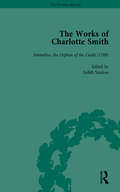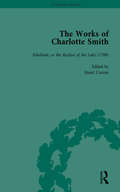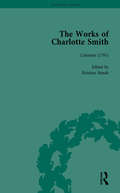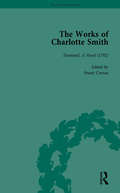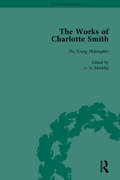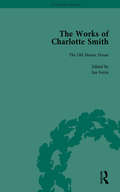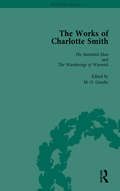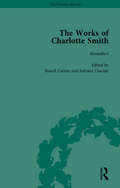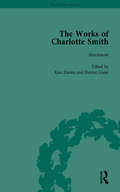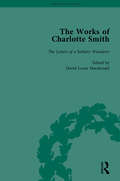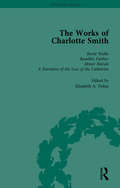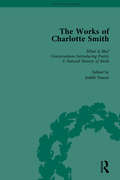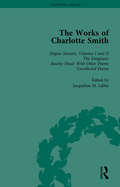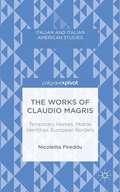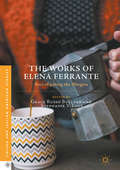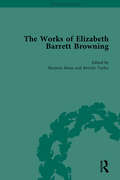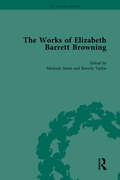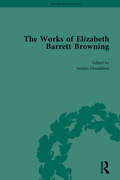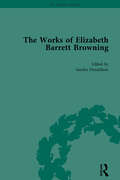- Table View
- List View
The Works of Aphra Behn: The Plays, 1678-1682 (The Pickering Masters)
by Janet ToddAphra Behn (1640-1689) was one of the most successful dramatists of the Restoration theatre and a popular poet. This is the first volume in a set of seven which comprises a complete edition of all her works. This volume is a collection of her poetry.
The Works of Aphra Behn: The Plays, 1678-1682 (The Pickering Masters)
by Janet ToddAphra Behn (1640-1689) was one of the most successful dramatists of the Restoration theatre and a popular poet. This is the fourth volume in a set of seven which comprises a complete edition of all her works.
The Works of Aphra Behn: The Plays, 1678-1682 (The Pickering Masters)
by Janet ToddAphra Behn (1640-1689) was one of the most successful dramatists of the Restoration theatre and a popular poet. This is the second volume in a set of seven which comprises a complete edition of all her works.
The Works of Aphra Behn: The Plays, 1678-1682 (The Pickering Masters)
by Janet ToddAphra Behn (1640-1689) was one of the most successful dramatists of the Restoration theatre and a popular poet. This is the third volume in a set of seven which comprises a complete edition of all her works.
The Works of Aphra Behn: The Plays, 1678-1682 (The Pickering Masters)
by Janet ToddAphra Behn (1640-1689) was one of the most successful dramatists of the Restoration theatre and a popular poet. This is the fifth volume in a set of seven which comprises a complete edition of all her works.
The Works of Charlotte Smith, Part I Vol 1
by Stuart CurranReveals the extent to which Charlotte Turner Smith's work constitutes as significant an achievement as her poetry, representing the turbulent decade of the 1790s on its social and political, as well as literary, planes with an unparalleled richness of detail and an unblinkered vision.
The Works of Charlotte Smith, Part I Vol 2
by Stuart CurranReveals the extent to which Charlotte Turner Smith's work constitutes as significant an achievement as her poetry, representing the turbulent decade of the 1790s on its social and political, as well as literary, planes with an unparalleled richness of detail and an unblinkered vision.
The Works of Charlotte Smith, Part I Vol 3
by Stuart CurranReveals the extent to which Charlotte Turner Smith's work constitutes as significant an achievement as her poetry, representing the turbulent decade of the 1790s on its social and political, as well as literary, planes with an unparalleled richness of detail and an unblinkered vision.
The Works of Charlotte Smith, Part I Vol 4
by Stuart CurranReveals the extent to which Charlotte Turner Smith's work constitutes as significant an achievement as her poetry, representing the turbulent decade of the 1790s on its social and political, as well as literary, planes with an unparalleled richness of detail and an unblinkered vision.
The Works of Charlotte Smith, Part I Vol 5
by Stuart CurranReveals the extent to which Charlotte Turner Smith's work constitutes as significant an achievement as her poetry, representing the turbulent decade of the 1790s on its social and political, as well as literary, planes with an unparalleled richness of detail and an unblinkered vision.
The Works of Charlotte Smith, Part II vol 10
by A. A. MarkleyCharlotte Turner Smith held a central position during the formative years of the British Romantic period. Smith's work includes eleven novels and two fictional adaptations from the French. This edition reveals the extent to which Smith's work in this form constitutes as significant an achievement as her poetry.
The Works of Charlotte Smith, Part II vol 6
by Stuart CurranCharlotte Turner Smith held a central position during the formative years of the British Romantic period. Smith's work includes eleven novels and two fictional adaptations from the French. This edition reveals the extent to which Smith's work in this form constitutes as significant an achievement as her poetry.
The Works of Charlotte Smith, Part II vol 7
by Stuart CurranCharlotte Turner Smith held a central position during the formative years of the British Romantic period. Smith's work includes eleven novels and two fictional adaptations from the French. This edition reveals the extent to which Smith's work in this form constitutes as significant an achievement as her poetry.
The Works of Charlotte Smith, Part II vol 8
by Stuart CurranCharlotte Turner Smith held a central position during the formative years of the British Romantic period. Smith's work includes eleven novels and two fictional adaptations from the French. This edition reveals the extent to which Smith's work in this form constitutes as significant an achievement as her poetry.
The Works of Charlotte Smith, Part II vol 9
by Kate Davies Harriet GuestCharlotte Turner Smith held a central position during the formative years of the British Romantic period. Smith's work includes eleven novels and two fictional adaptations from the French. This edition reveals the extent to which Smith's work in this form constitutes as significant an achievement as her poetry.
The Works of Charlotte Smith, Part III vol 11
by David Lorne MacdonaldIncludes the works of Charlotte Smith, revealing a writer who wrote well in many genres, and, in whatever form she undertook, was innovative with the forms she inherited and strongly influential on those who followed her.
The Works of Charlotte Smith, Part III vol 12
by Stuart CurranIncludes the works of Charlotte Smith, revealing a writer who wrote well in many genres, and, in whatever form she undertook, was innovative with the forms she inherited and strongly influential on those who followed her.
The Works of Charlotte Smith, Part III vol 13
by Stuart CurranIncludes the works of Charlotte Smith, revealing a writer who wrote well in many genres, and, in whatever form she undertook, was innovative with the forms she inherited and strongly influential on those who followed her.
The Works of Charlotte Smith, Part III vol 14
by Stuart CurranIncludes the works of Charlotte Smith, revealing a writer who wrote well in many genres, and, in whatever form she undertook, was innovative with the forms she inherited and strongly influential on those who followed her.
The Works of Claudio Magris: Temporary Homes, Mobile Identities, European Borders
by Nicoletta PiredduItalian scholar, novelist, journalist, and philosopher Claudio Magris is among the most prominent of living European intellectuals. This study is the first comprehensive critical analysis of Magris's corpus for an English-speaking audience and addresses the crucial question of the return to humanism that is moving literature and theory forward.
The Works of Elena Ferrante
by Grace Russo Bullaro Stephanie V. LoveThis book is the first dedicated volume of academic analysis on the monumental work of Elena Ferrante, Italy's most well-known contemporary writer. The Works of Elena Ferrante: Reconfiguring the Margins brings together the most exciting and innovative research on Ferrante's treatment of the intricacies of women's lives, relationships, struggles, and dilemmas to explore feminist theory in literature; questions of gender in twentieth-century Italy; and the psychological and material elements of marriage, motherhood, and divorce. Including an interview from Ann Goldstein, this volume goes beyond "Ferrante fever" to reveal the complexity and richness of a remarkable oeuvre.
The Works of Elizabeth Barrett Browning Vol 1
by Sandra Donaldson Rita Patteson Marjorie Stone Beverly Taylor Simon Avery Cynthia Burgess Clara Drummond Barbara NeriA canonical Victorian writer and thinker, Barrett Browning personified the engaged intellectual. This edition provides a foundation for a complete analysis and interpretation of her works – and of Victorian Britain. The edition presents accurate and accessible texts of all her published literary works. Volume 1 General Introduction Poems, 4th edn (1856).
The Works of Elizabeth Barrett Browning Vol 2
by Beverly Taylor Simon Avery Marjorie Stone Clara Drummond Sandra Donaldson Rita Patteson Cynthia Burgess Barbara NeriA canonical Victorian writer and thinker, Barrett Browning personified the engaged intellectual. This edition provides a foundation for a complete analysis and interpretation of her works – and of Victorian Britain. The edition presents accurate and accessible texts of all her published literary works.
The Works of Elizabeth Barrett Browning Vol 3
by Beverly Taylor Simon Avery Marjorie Stone Clara Drummond Sandra Donaldson Rita Patteson Cynthia Burgess Barbara NeriA canonical Victorian writer and thinker, Barrett Browning personified the engaged intellectual. This edition provides a foundation for a complete analysis and interpretation of her works – and of Victorian Britain. The edition presents accurate and accessible texts of all her published literary works. Volume 3: Aurora Leigh, 4th edn (1859)
The Works of Elizabeth Barrett Browning Vol 4
by Sandra Donaldson Rita Patteson Marjorie Stone Beverly Taylor Simon Avery Cynthia Burgess Clara Drummond Barbara NeriA canonical Victorian writer and thinker, Barrett Browning personified the engaged intellectual. This edition provides a foundation for a complete analysis and interpretation of her works – and of Victorian Britain. The edition presents accurate and accessible texts of all her published literary works. Volume 4 The Battle of Marathon (1820) An Essay on Mind, with Other Poems (1826) from Prometheus Bound, and Miscellaneous Poems (1833) from T e Seraphim and Other Poems (1838) Poems before Congress (1860) Other Previously Published Prose and Poetry.
